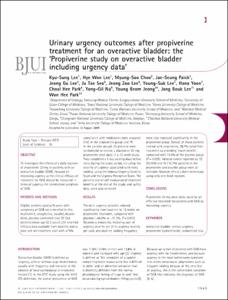Urinary urgency outcomes after propiverine treatment for an overactive bladder: the ‘Propiverine study on overactive bladder including urgency data’
- Keimyung Author(s)
- Park, Choal Hee
- Department
- Dept. of Urology (비뇨의학)
- Journal Title
- BJU international
- Issued Date
- 2010
- Volume
- 105
- Issue
- 11
- Abstract
- OBJECTIVE:
To investigate the effects of a daily regimen of propiverine 20 mg in patients with an overactive bladder (OAB), focused on improving urgency, as the clinical efficacy of treatment for OAB should be measured in terms of urgency, the cornerstone symptom of OAB.
PATIENTS AND METHODS:
Eligible patients aged > or = 18 years with symptoms of OAB were enrolled in this multicentre, prospective, parallel, double-blind, placebo-controlled trial. Of 264 patients (mean age 52.2 years), 221 who had efficacy data available from baseline and at least one on-treatment visit with >75% compliance with medication were analysed (142 in the propiverine group and 79 in the placebo group). All patients were randomized to receive a placebo or 20 mg propiverine once daily in a 12-week study. They completed a 3-day voiding diary before visits during the study period, including the severity of urgency associated with every voiding, using the Indevus Urgency Severity Scale and the Urgency Perception Score. The patients' overall self-evaluation of treatment benefits at the end of the study, and safety data, were also collected.
RESULTS:
The daily urgency episodes reduced significantly from baseline to 12 weeks on propiverine treatment, compared with placebo (-46.0% vs -31.3%, P = 0.005). Secondary endpoints, including sum of urgency severity per 24 h, urgency severity per void, and daytime voiding frequency, were also improved significantly in the propiverine group. Overall, of those patients treated with propiverine, 38.7% rated their treatment as providing 'much benefit', compared with 15.2% of the placebo group (P = 0.025). Adverse events reported by 32 (22.5%) and 10 (12.7%) patients in the propiverine and placebo group were all tolerable. However, this is a short-term study using only one fixed regimen.
CONCLUSIONS:
Propiverine 20 mg once-daily could be an effective treatment for patients with OAB, by improving urgency.
- Keimyung Author(s)(Kor)
- 박철희
- Publisher
- School of Medicine
- Citation
- Kyu-Sung Lee et al. (2010). Urinary urgency outcomes after propiverine treatment for an overactive bladder: the ‘Propiverine study on overactive bladder including urgency data.’ BJU international, 105(11), 1565–1570. doi: 10.1111/j.1464-410X.2009.09050.x
- Type
- Article
- ISSN
- 1464-4096
- Appears in Collections:
- 1. School of Medicine (의과대학) > Dept. of Urology (비뇨의학)
- 파일 목록
-
-
Download
 oak-aaa-00643.pdf
기타 데이터 / 301.73 kB / Adobe PDF
oak-aaa-00643.pdf
기타 데이터 / 301.73 kB / Adobe PDF
-
Items in Repository are protected by copyright, with all rights reserved, unless otherwise indicated.